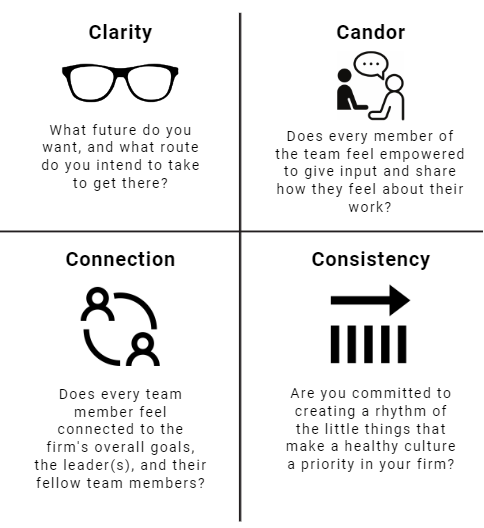*This blog is part of the September Thought Leader newsletter.
 In the competitive world of business, small to medium-sized accounting firms often find themselves juggling numerous responsibilities. Among these challenges, two aspects stand out as paramount for long-term success: staff retention and staff development.
In the competitive world of business, small to medium-sized accounting firms often find themselves juggling numerous responsibilities. Among these challenges, two aspects stand out as paramount for long-term success: staff retention and staff development.
If you’re a Rootworks member, or you’ve read these Thought Leader articles previously, you’ll know one of our mantras is that a firm’s two most valuable assets are its client list and its staff. Many firms put a great deal of intention into selecting their client list, only to find themselves unable to develop and keep their best staff members.
These two pillars, retention and development, not only shape the firm’s culture but also play a pivotal role in driving growth, building expertise and ensuring consistency within the firm.
The bedrock of stability
In the fast-paced world of accounting, continuity is essential. Staff retention serves as the bedrock of stability. Retaining staff allows a firm to maintain consistent client relationships, streamline operations and nurture a cohesive company culture. High turnover rates disrupt workflow. Turnover can also erode trust as clients are shuffled between accountants.
As coaches, we meet with many firm owners experiencing these struggles. When employees feel valued and invested in the company’s success, this creates a sense of belonging which leads to long-term loyalty.
One way to do this is to tie their success to the company’s. Some firms choose to do this by implementing KPI-based performance bonuses. Another way is to have regular discussions with staff about their career goals. When having these discussions, explain how their career goals line up with the future of the firm.
In last month’s Thought Leader newsletter, Anna Skowronek discussed the importance of having open communication with your team. That communication is vital for staff to feel connected with firm leadership, and their part in the firm’s future.
Building a resilient culture
A firm’s culture is not just a buzzword; it’s the DNA that shapes its identity. An environment that values staff retention and development sends a clear message to employees that their contributions matter. This fosters a sense of pride, ownership and accountability, leading to a more resilient and united workforce. A strong company culture not only attracts top talent but also instills a sense of purpose that drives everyone to work together toward shared goals.
Culture can be a difficult thing to materialize and to fully comprehend, since it’s not necessarily tangible and can be difficult to measure. Rootworks defines firm culture as “the collective beliefs and behaviors of a firm.” Much work has gone into that short sentence because we’ve learned that it’s at the belief and behavior level where real change occurs.
To create a clear and simple strategy for healthy firm culture, Rootworks has simplified this effort into four essential ingredients that you can intentionally introduce into the “roots” of your firm. We refer to them as the Four Cs: clarity, candor, connection and consistency (Rootworks members can follow this link to learn more about the Four Cs in addition to what’s shown in the graphic below).

The growth catalyst
Staff development is the secret ingredient that fuels growth and innovation in accounting firms. In an industry constantly evolving due to regulatory changes and technological advancements, having a workforce that’s equipped with up-to-date skills is non-negotiable. Providing ongoing training, workshops and opportunities for professional growth empowers employees to stay ahead of the curve. This enhances the firm’s capabilities and gives clients confidence that they’re receiving expert advice.
Cultivating expertise and specialization
Small to medium-sized accounting firms might not have the vast resources of their larger counterparts, but they can leverage staff retention and development to carve out their niche in the market.
While firms may lack the resources to invest heavily in marketing or sales efforts, they can make up for it in agility and adaptability. By retaining experienced professionals and investing in their development, these firms can cultivate expertise in specific areas, such as tax planning, advisory services and industry-specific niches. This specialization not only attracts clients seeking tailored solutions, but also gives the firm a competitive edge in the industry.
Make sure you understand the strengths of your firm and your staff. Having regular meetings with individuals on your team ensures that you’ve aligned expectations, goals and areas to improve—and can be a big step in cultivating expertise and specialization within your firm. (Rootworks members can use the Rootworks 3-3-1 template for quarterly employee reviews, which are meant to be a check-in for the manager as well as the employee.)
Investing in your staff is an investment in your firm
In the dynamic world of accounting, firms often face unique challenges that demand creative solutions. Staff retention and development stand out as linchpins for these firms, anchoring stability, fostering growth and nurturing a culture of excellence.
A byproduct of the benefits of an established staff that stays with a firm for an extended period is client satisfaction—the cornerstone of any successful accounting practice. When staff members have the opportunity to grow and advance within the firm, they become more engaged and motivated to deliver exceptional service. Satisfied employees translate to satisfied clients, as they benefit from knowledgeable professionals who understand their unique needs and challenges.
A stable and well-developed staff is better equipped to build lasting relationships, resulting in increased client loyalty and referrals. By recognizing the vital role that employees play in the firm’s success and investing in their well-being and professional growth, accounting practices can position themselves for long-term prosperity in an ever-evolving industry. After all, a firm is only as strong as the team that powers it.
